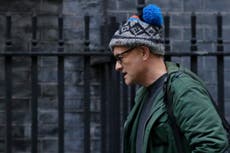Dominic Cummings accused of perverting course of justice after Barnard Castle trip
New dossier sent to police and prosecutors after prime minister’s chief adviser denied wrongdoing
Your support helps us to tell the story
From reproductive rights to climate change to Big Tech, The Independent is on the ground when the story is developing. Whether it's investigating the financials of Elon Musk's pro-Trump PAC or producing our latest documentary, 'The A Word', which shines a light on the American women fighting for reproductive rights, we know how important it is to parse out the facts from the messaging.
At such a critical moment in US history, we need reporters on the ground. Your donation allows us to keep sending journalists to speak to both sides of the story.
The Independent is trusted by Americans across the entire political spectrum. And unlike many other quality news outlets, we choose not to lock Americans out of our reporting and analysis with paywalls. We believe quality journalism should be available to everyone, paid for by those who can afford it.
Your support makes all the difference.A former crown prosecutor has sent authorities a dossier accusing the prime minister’s chief adviser of breaking coronavirus laws and perverting the course of justice.
Dominic Cummings denies wrongdoing over taking his family to County Durham during the UK-wide lockdown in April, when his wife had Covid-19 symptoms.
Police later found that he may have breached the law during a trip to Barnard Castle, but said they would not fine or prosecute him.
Lawyers acting for Nazir Afzal OBE, the former chief crown prosecutor for northwest England, have now sent investigators legal submissions calling for action to be taken.
The documents argue that there is sufficient evidence for Mr Cummings and his wife, Spectator commissioning editor Mary Wakefield, to be charged.
In a statement, Mr Afzal’s lawyers said there was evidence of six offences under the Health Protection Regulations for Mr Cummings and three for Ms Wakefield.
“It also concludes that the test [for bringing charges] appears to be satisfied in relation to one offence of perverting the course of justice, that arises from Mr Cummings’ statement in the Rose Garden in Downing Street on 25 May,” it added.
At a press conference, the adviser said he had travelled to Barnard Castle to see if he could drive safely because he was experiencing problems with his eyesight.
Mr Cummings said he returned to London with his family on 13 April, and did not return to County Durham.
Mr Afzal’s lawyers alleged that some of his assertions were inconsistent with accounts obtained from witnesses, and called for police to check CCTV, location data and traffic cameras.
New witness statements and other material was sent on Friday to the director of public prosecutions, Crown Prosecution Service (CPS) and police.
Mr Afzal, whose brother died of coronavirus earlier this year, accused Durham Constabulary of carrying out a “cursory and incomplete” initial investigation.
“Whilst tens of thousands of families, including mine, were struggling to mourn their loved ones, Mr Cummings was allegedly travelling the country with no consideration of the consequences,” he said.
“It is now a matter for the police and CPS to decide whether to take this forward. There is a perception currently that the law isn’t being applied equally and the poorest, most vulnerable and least powerful of our citizens are those that suffer. We will watch with great interest.”
In May, police concluded that Mr Cummings did not break the law with his initial 260-mile journey from London to his parents’ farm in County Durham.
At the time of the journey, at the end of March, his wife had symptoms of coronavirus and he fell ill days later.
Mr Cummings said that because his wife was ill and he was working, he wanted to be near relatives so they could take care of their son if needed.
At the time, the Health Protection Regulations made it illegal to leave home without “reasonable excuse”.
The law contained several exceptions, including “to access critical public services, including childcare or educational facilities”.
Childcare was not defined in the legislation at the time, but it was changed in June to specifically exclude relatives.
Durham Constabulary said there “might have been a minor breach of the Regulations that would have warranted police intervention” with Mr Cummings’ trip to Barnard Castle on Easter Sunday.
The force said there was “no intention to take retrospective action in respect of the Barnard Castle incident since this would amount to treating Mr Cummings differently from other members of the public”.
Investigators also said they found insufficient evidence to support media reports that the adviser was in Durham on 19 April, which he denies, and would be taking no further action.
A spokesperson for Durham Constabulary said: “We have received the papers and they will be considered.”
The Metropolitan Police said it had also received the documents and would review them in due course.
A CPS spokesperson said investigations into alleged criminal conduct were a matter for the police and that it has no power to direct them.
”Given this, we are surprised that the material was provided to us,” he added.
“Once we have satisfied ourselves as to its contents, the CPS will take the steps we consider to be appropriate. This may include advising Mr Afzal that this is a matter for the appropriate investigatory body.”



